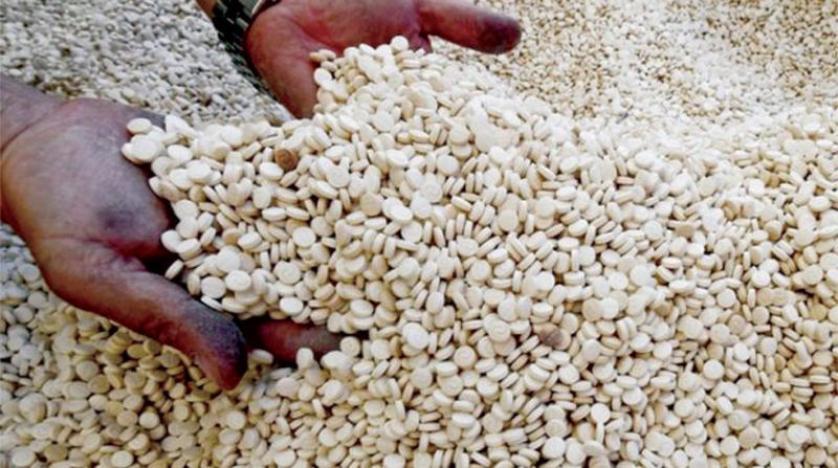The Syrian Observatory for Human Rights (SOHR) issued a report on narcotic manufacturing and cannabis cultivation in areas under Iran-backed militias’ influence in Deir-ez-Zor.
Through ongoing monitoring of the manufacture of narcotics, SOHR identified the locations of seven illicit drug-manufacturing laboratories in areas under the control of Iranian-backed militias in Deir-ez-Zor.
The Observatory said there is no doubt that Iran continues exerting tenacious efforts to embed its presence in Syria, and increase its resources.
“Drug business” has become the primary source of income for Iranian-backed militias in Syria, especially in areas under their control in the Deir-ez-Zor countryside, namely the west Euphrates region.
SOHR sources identified the locations of seven illicit drug-manufacturing laboratories in areas under the control of Iranian-backed militias.
Read also: Recap: Israel Intensifies Attacks on Syria
The militias affiliated with Iran introduced drugs to their areas of influence in Deir-ez-Zor, coming from the places of their manufacture in al-Qusayr in the southeastern countryside of Homs, or the border areas with Lebanon. Both locations are under the full supervision of the Lebanese Hezbollah.
However, the increased spread of drugs in Deir-ez-Zor, their promotion, and smuggling to other areas of control and outside Syrian territory through Iraq prompted the Iranian militias during the past months to manufacture drugs by establishing primitive laboratories in separate regions of the governorate.
They wanted to avoid the risks of transporting drug shipments to other provinces, fearing attacks and armed robberies, and seeking to reduce the expenses of transporting these shipments.
The seven locations for illicit drug-manufacturing laboratories in Deir-ez-Zor include a villa in the al-Qusayr neighborhood and six primitive plants as follows: near Bahrat Afrah, a building near the headquarters of the electrical and mechanical engineering institution in “Port Said” street, a plant near the al-Mualimeen park, a plant in the al-Khanat area on the outskirts of the al-Mayadeen city, a plant in al-Hezam area in al-Bokamal, and a plant in al-Villa street.
The Observatory estimated the number of plants and laboratories where narcotics are manufactured to be much higher.
However, activists could not detect them because of the strict security measures imposed by Iranian-backed militias and the extreme secrecy shrouding laboratories in different areas across Deir-ez-Zor.
Furthermore, the militias affiliated with Iran have been planting cannabis (hashish), for many months, on lands owned by displaced people in Salu and- Zabari, east of Deir-ez-Zor well.
The report said a number of militias were involved in these activities, including Lebanese Hezbollah, Iraqi Hezbollah, Iranian Revolutionary Guards Corps (IRGC), Asa’ib Ahl al-Haq and al-Abdal movement affiliated with the Iraqi Popular Mobilization Forces (PMF), the National Defense Forces (NDF), the Fourth Division, and the Army of Tribes.
According to the report, the tasks assigned to these militias vary, from protection, securing raw materials, securing roads, supervision, providing logistical support, promotion, and smuggling operations.
The Lebanese Hezbollah brings compressors from al-Qusayr to the plants in Deir-ez-Zor and shares with the IRGC the securing of raw materials needed for manufacturing tablets of captagon.
Reliable sources told the Observatory that Lebanese and Iranian experts supervise the manufacture of narcotics and the plantation of hashish in areas under the control of Iranian-backed militias in Deir-ez-Zor.
The role of the remaining militias is limited to promoting drug trafficking, protection, and smuggling operations to SDF-controlled areas and other countries through Iraq.
The Syrian Observer has not verified the content of this story. Responsibility for the information and views set out in this article lies entirely with the author.


